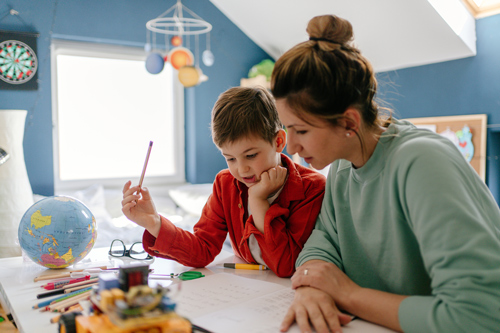
My child's kindergarten homework was tormenting me. Was I really going to have to tell my daughter that I couldn't help her? It was a Wednesday night, and here I was, staring down at a beginner's Hebrew sheet, meant for a five-year-old, and I was stumped. I felt immense shame, how did I not know this? I knew the letters on the page were vav and zayin. My confusion began with the picture of a winged insect. Was I looking for the first letter of the word for 'bug'? Maybe 'bee'? Or was it 'fly'? There were too many possibilities. So, I gathered all the dictionaries I could find. Scouring the pages for anything that could help. Without contextual Hebrew knowledge, I could not figure out what the image on her homework was supposed to be.
My knowledge of the Hebrew language is limited, I wasn't exposed until college. When I started the conversion process, I was past the ideal age for learning a new language. Learning has been a slow process. Now I can finally sound out words and recognize some of the language in prayers. However, none of what I learned was helpful as I stared at my daughter's kindergarten homework. For many converts, our children's knowledge will supersede our own quickly. It makes sense. After all, they hear prayers and are immersed into Jewish life within days of being born. Their brains are primed to absorb all that information. None of that was quite able to reassure me though.
I was vulnerable enough to reach out to my community for answers.
Instead of dwelling on my lack of knowledge, I decided to get resourceful. In Pirkei Avot 2:4, Hillel teaches “Do not separate yourself from the community.” I decided to heed that advice. With the slightest bit of embarrassment, I sent some of my friends pictures of the worksheet with a simple plea: “HELP!” Immediately the responses flooded in, it was a fly or זבוב (zvuv).
I sighed, we circled the zayin, and we moved on. My daughter quickly transitioned to watching Paw Patrol after homework. But, I believe that both she and I learned a lesson that day.
It was hard to say 'I don't know' to my child. But by doing so, I taught her about vulnerability and a valuable lesson about Jewish principles. One that she won't find in her Hebrew book. I was able to show her the power of kehillah, of community, and practice the value espoused by Ben Zoma in Pirkei Avot 4:1, “Who is wise? He who learns from all”. I also taught her that it's okay to admit when you don't know something.
As her mother I felt obligated to know the material on her homework. When I didn't, I was vulnerable enough to reach out to my community for answers. There will be a lot I will not know as she grows up. But she and I will both know to lean on our community, and to continue learning together.